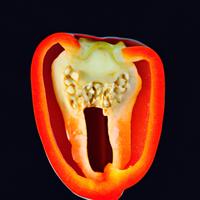
1 serving (75 grams) contains 20 calories, 0.6 grams of protein, 0.2 grams of fat, and 4.6 grams of carbohydrates.

Log this food in SnapCalorie

Nutrition Information
Calories |
40.0 | ||
|---|---|---|---|
% Daily Value* |
|||
| Total Fat | 0.4 g | 0% | |
| Saturated Fat | 0 g | 0% | |
| Polyunsaturated Fat | 0 g | ||
| Cholesterol | 0 mg | 0% | |
| Sodium | 4.0 mg | 0% | |
| Total Carbohydrates | 9.2 g | 3% | |
| Dietary Fiber | 3 g | 10% | |
| Sugars | 4.8 g | ||
| protein | 1.2 g | 2% | |
| Vitamin D | 0 mcg | 0% | |
| Calcium | 12 mg | 0% | |
| Iron | 0.6 mg | 3% | |
| Potassium | 300 mg | 6% | |
* Percent Daily Values are based on a 2,000 calorie diet. Your daily values may be higher or lower depending on your calorie needs.
Food Attributes
Source of Calories
About Half a bellpepper
Half a bell pepper is a colorful, nutrient-rich vegetable commonly used in global cuisines, particularly Mediterranean, Mexican, and Asian dishes. Bell peppers come in various colors, including green, red, yellow, and orange, each offering slightly different flavor profiles and nutrient content. Half a bell pepper provides an excellent source of vitamin C, vitamin A, and antioxidants, which support immunity, vision, and skin health. It is low in calories (around 20-25 calories) and free of fat, making it a great option for weight management. Bell peppers also contain fiber, which aids digestion, and a mix of potassium and folate, contributing to heart health. This vegetable is versatile, often enjoyed raw in salads or cooked in stir-fries, soups, or stuffed recipes. While bell peppers are generally healthy, individuals with sensitive digestion may need to moderate their intake due to their natural compounds.



